Top Ten Most Original Speculative Fiction Story Worlds, Part 1
Readers of this article who know me on Facebook probably will have noticed I asked on several sites that cater to Christian writers of science fiction, fantasy, and horror, what they thought were some of the most original story worlds of all time. I apologize that it’s not possible for me to include everyone’s choice. That’s true even though I decided I couldn’t narrow this list down to just one set of ten. This week I’ll look at the ten best “secular” (or not specifically Christian) stories and next week I’ll do the top ten original story worlds from Christian authors.
Edit By accident, I included the Myst series on this list. However, I was repeatedly and clearly assured after the fact that its authors are Christians. So, I’m moving Myst over to the part 2 list, and editing this post to include The Call of Cthulu short story. (Of course Alice in Wonderland also had a Christian author, but I’m leaving it where it appears on this list.)
Why “most original” story worlds?
Speculative fiction is different from setting a story in a realistic scenario. Plot and characters are important for any kind of story, but in speculative fiction, the author gets to create the world from scratch if he or she chooses to do so. Yeah, some writers for a variety of reasons pick settings that are realistic or close to it (like Urban Fantasy). But one of the greatest powers science fiction, fantasy, and horror can choose to exercise is to make completely unfamiliar worlds that nonetheless make internal sense. The creation of these story worlds I would say is a unique achievement, often bolstered by specific story ideas that make a tale more than just entertainment. Speculative fiction can be and has been commentary on ordinary life. Science fiction comments in particular on the potential power of technology. Epic fantasy weighs in on the ultimate nature of good and evil, while horror looks at the inner darkness so common in our world, usually contrasting it with light. Much of this commentary, these powerful ideas found in speculative fiction, are found in the story worlds themselves. Rather than plot or character.
So strongly original story worlds often make the best stories–or at least the ones that impact people in the real world the most. These are the stories that get people to think about what could and could not be, what is and is not true. And helps them understand all of that better.
How did I choose and rate them?
I’ve considered novels, short stories, television, and movies. I admit to a sampling bias–media I’ve read or seen myself was more likely to make this list than media I haven’t seen myself. That’s true even though I did ask for other people to include their favorites and have included here two story worlds I personally don’t know much about and had to research (Myst and One Piece). Inevitably a story world I know little about is rated less objectively than ones I know.
I rated rated each story from 1 to 5 on originality, influence on other stories, sales influence, and influence on public discourse concerning the themes these tales cover. All of these stories rated between eleven and seventeen in my system with a number of ties. But the assigning of numbers was itself a bit subjective. So I also assigned subjective rankings to the ties.
So, starting from number 10 and working our way to 1:
10. Ringworld
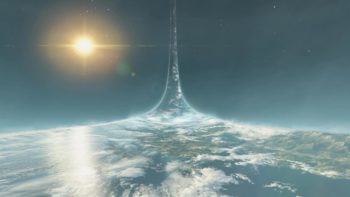
Looking at a ringworld from the inside. Image copyright: Trevor B. Williams
1970’s Ringworld is a load of fun for people enamored with technology and what the future of humanity might include in terms of tech. While it doesn’t include even the Internet as we know it, it features human beings with near-infinite lifespans, x-ray lasers, inertialess drive, variable swords (like a light saber, but better), super materials, and most importantly, a world in the shape of a ring, that produces scientifically realistic artificial gravity by spinning. Also featuring interesting and convincing aliens and an oblique reference to the Tree of Life in the Bible–though the “real” tree of life is a fruit a human being can’t resist eating that’s designed to convert a human into another stage of life, a Pak (who are bald and toothless, with over-sized joints, which is supposedly why humans lose hair and teeth and suffer from arthritis as we age). Certainly a thought-provoking series in a number of ways.
Ringworld wasn’t wholly original, borrowing from the concept of a Dyson Sphere and many other tech ideas. So I rated it a 4 on originality. Ringworld has had limited influence on certain other stories. For example, the video game Halo is set on a “ringworld”–so I gave it a 3 for influence. Ringworld sold well for a science fiction book but didn’t become an all-time best-seller, so it got 3 for sales. As far as influence on public discourse goes, I think only hard-core fans of Ringworld would ever talk about its meaning, even though it’s thought-provoking, so it rated a 1. 11 points total.
On the downside, Ringworld features a story setting that like so much of science fiction, simply assumes humans will no longer be religious in the distant future. There are no references to God or faith that I remember. The series includes some graphic sexual content. Overall, a negative moral influence in my estimation.
9. The Call of Cthulu
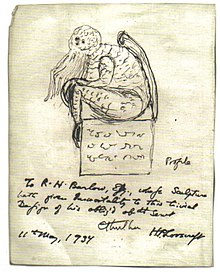
Original sketch of Cthulu by H.P. Lovecraft. Image source: Wikipedia Commons.
The first version of this post omitted H. P. Lovecraft altogether, a serious error. Overall, what’s called the “Cthulu Mythos” has been hugely influential and was quite original, which would earn the overall “mythos” a significantly higher place on this list than the short story that introduced Cthulu itself. However, the mythology of Cthulu built over time, over a body of short stories and now anthologies, games, and video games. This placement at number nine is based on Lovecraft’s original introduction of Cthulu.
In the short story The Call of Cthulu, H. P. Lovecraft introduced cosmic horror, which was an entirely new genre. Personifying the uncaring universe of evolution as a hostile alien, worshiped by human beings driven insane by the very nature of the god-alien, the story rates a 5 for originality. Lovecraft’s overall body of work has been far more influential than this short story itself, so we’ll put it at a 3 for influence on other stories. As far as sales are concerned, while Cthulu-related stories have become top sellers, the original short story never sold well, 2 points. As far as getting people to talk about the nature of a universe without God, certainly many people do so, but I think most people, even Lovecraft fans, are more aware of the weirdness of Lovecraft’s god-monsters than they consider how his atheism shaped the worldview: 3 points. 13 points total.
The negative influence of this story stems from Lovecraft’s atheism. But while its background ideas assume that Jehovah is fictional, the universe Lovecraft created is a bleak and terrifying place. While some people have fallen in love with Lovecraft and become fascinated by every aspect of his fictional worldview, I would say fascination with nihilism as seen in Lovecraft’s work does not appeal to most people. Certainly there are negative influences in this story, but it’s probably more powerful (in terms of working evil influence) for people to simply ignore God than to contemplate the terrors that might occupy a godless cosmos.
8. Story of Your Life
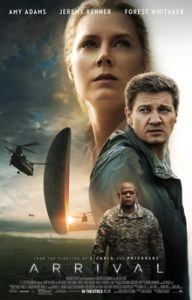
Arrival Movie Poster–the movie based on Ted Chiang’s novella. Image copyright: Paramount.
Better known by its film adaptation, Arrival, I’d like to give Ted Chiang’s 1998 Nebula-award-winning novel credit where it’s due, more than the movie (because stories shorter than novels can be very influential at times and deserve that acknowledgement). The story looks at a linguist, Dr. Louise Banks, studying an alien language. The aliens say entire sentences as whole units, which means no one element of a sentence comes logically before another. The act of studying the language eventually changes Louise, making her capable of thinking out of temporal order–which in turn causes her to experiences events of her life out of order, as if her mind were time-traveling.
This tale is thought-provoking on the nature of consciousness, language, aliens, and touches on destiny and free will.
This story tops out originality at 5, but has had only a limited influence on other works, 2. It sold well for a novella, but was not at the top in sales–3. And while the ideas behind Story of Your Life / Arrival are very interesting and get people talking about fate and destiny and the experience of time related to language, the relatively limited audience for Story of Your Life limited its influence on public discourse, 3. 13 points total.
On the downside, again, thinking about God even in a time of personal tragedy is omitted from the tale. The story also strongly suggests that free will is just an illusion, which most Christians would not agree with.
7. Foundation Series
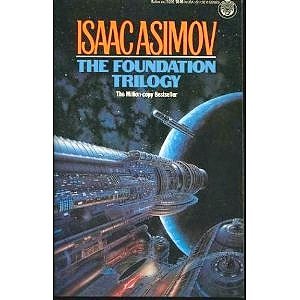
Copyright owner: Gnome Press
Isaac Asimov’s Foundation was first published in 1951, the first in a series of books. The series imagines a galactic empire in the distant future on the verge of collapse, predicted by one of its brightest minds of that time, Hari Seldon, in something he called “psychohistory.” Psychohistory is imagined to allow a person to mathematically predict what masses of humans will do with complete accuracy. While an individual would be unpredictable, individuals don’t usually matter, mass movements do. Seldon tries to shorten the amount of time the galaxy will spend in barbarism by creating the Foundation, which will be dedicated to preserving civilization and helping rebuild a second galactic empire.
Influenced by other sci fi tales of empire and histories like Gibbon’s Decline and Fall of the Roman Empire, Asimov’s story world is not wholly original. Really the concept of psychohistory alone was wholly new, but one radically new idea was enough to rate this series as a 4 for originality. Numerous sci-fi stories have been partially influenced by the Foundation series, including Douglas Adam’s Hitchhiker’s Guide to the Galaxy. But it has never been adapted to film or TV, so I rate it a 3 for influence on other stories. The series was a sci-fi bestseller for decades, but didn’t get the big film dollars, so 4 on sales. As far as its influence on the general populace, it suffers a bit from not being as widely-known as films are, but does lead to thinking not only about the nature of fate versus free will, but also on the power of individual action versus collective action. The books have influenced real-world scientists and inventors (as mentioned in the linked article), making their impact deep, albeit narrow. So a 3 for influence on the public. Overall rating: 14.
On the downside, yet again, an entire very advanced civilization exists in the distant future in which humanity has become essentially irreligious, as if faith or belief in God is itself a sign of a lack of civilization.
6. Jurassic Park
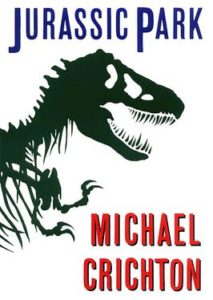
Image copyright: Alfred A. Knopf
Michael Crichton’s 1990 novel contained all the original story world ideas that the Jurassic Park and Jurassic World franchise would develop later. In essence, Crichton anticipated that advances in genetic technology would allow astounding changes to become possible in the future. Even bringing back extinct species, to include dinosaurs. The novel was intended to be a cautionary tale about the dangers of genetic engineering. Malcolm the mathematician who criticizes the park reliably serves as Crichton’s own voice on the subject–that the type of control they were attempting in the story could not succeed because “life finds a way.” Thought-provoking in its look at the role of future technology, with sidetracks into discussions of chaos theory, Jurassic Park as a novel was far more cerebral than its film adaptions would become. Which, of course, were mostly about dinosaurs eating people. 🙂
The idea of bringing back dinosaurs, including the tidbit that their DNA could perhaps be salvaged from amber was wholly original at the time. However, being set in the near future of the real world limits the overall originality of the story setting, so this tale rates a 4 for originality. In terms of influence on other stories, its main influence has been to spawn its own franchise. Though some other stories have taken up the issue of genetic engineering, relatively few have–3 for influence on other stories. As far as sales go, Jurassic Park has done very well, 5 points. As far as influence on public discourse, while the novel was clearly intended to get people talking about genetic engineering and people do talk about it because of Jurassic Park to a degree, I would say the rest of the franchise became all about seeing dinosaurs for most people and watching people get eaten. So 3 for influence on public discourse. 15 points overall.
Downsides–kinda violent, albeit with limited gore. And maybe there’s a person or two who calls on God as he’s about to be eaten. But overall, JP is as irreligious as anything else. Faith is simply erased from mention, as if nobody with personal faith would even be around in such a story world. Because, you know, faith is so unusual…
5. One Piece
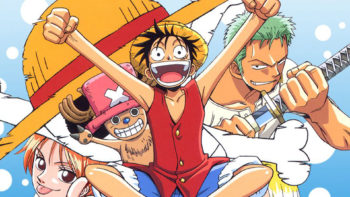
One Piece: Image copyright Eiichiro Oda
First created as a manga by Japanese artist and illustrator Eiichiro Oda, One Piece features a Monkey D. Luffy with a band of pirates looking to become next king of the pirates by acquiring the “one piece” treasure. When you mention pirates looking for treasure, my brain starts to go into “I’m bored now mode,” but assurances from multiple people on Facebook that this is a great story and very original led me to dig deeper. Lots of strange creatures and animals exist in Oda’s fantasy setting. The world itself consists of a vast ocean and one long, thin continent. Demon fruit and the latent ability of “haki” makes something like a unique and very unusual magic system. From what I gather this story is full of unexpected details at every turn, details the story makers have meticulously build upon over time.
So, in part taking the word of others here (I’ve never seen One Piece; I’ve only read about it), this story world is wildly original, yet internally consistent–5 points. The influence on other stories seems limited (as far as I can tell) to its own franchise. But the One Piece franchise is enormously popular worldwide, with manga comics, anime films, TV, video games, and even theme parks! Since it’s influence is enormous but mostly within its own franchise, I’ll give a 4 for influence. As far as sales go, while One Piece has had limited success in the USA, its sales worldwide top the charts for manga and anime–5. Influence on public discourse, as in ideas that make people think about the nature of reality or decide to become a scientist or something–uh, as far as I can tell, One Piece has very little of that–1 point (if you disagree, feel free to mention One Piece’s influence on the public in the comments below). 15 points total.
On the downside, I can’t say. I haven’t experienced One Piece. I could guess that the show contains no references to God at all, but it in fact may reference God. It certainly does reference supernatural power. Could it reference that power in a way that could promote substituting a reverence for supernatural power outside of God for a relationship with God? I don’t know. Perhaps. (Most stories have a downside of some kind, though not all are equal in that respect…)
4. Gattaca
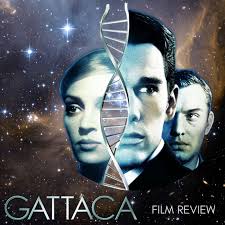
Image source: DNA podcast
The 1997 film Gattaca responds to the same scientific advances in genetic engineering that inspired Jurassic Park but talks about how genetic technology might be applied to human beings in the future. By imagining a society where genes are seen as destiny and the elite consist of those whose genes have been cleansed, the story focuses around Vincent Freeman, who is not part of the genetically engineered upper crust but seeks to join it by faking his DNA profile. The story questions the value of attempting to re-engineer the human race from a perspective mostly critical of any attempt to do so. But the desire to get rid of genetic defects receives a measure of sympathy as well.
By creating an immersive story world in which continual genetic testing was essential to establishing a person’s identity and status, Gattaca made its central issue of a person’s genetic status impossible to ignore and also key to the story. I give it 5 for originality. In terms of influence on other stories, Gattaca probably was more influential in showing its elite separated from the ordinary masses, established by continual testing. That situation was picked up by other stories such as Elysium but overall, looking at genetic fitness did not become a feature of numerous other stories–3. Gattaca’s sales at the time were disappointing, though it’s seen as a classic today, and it hasn’t spawned a franchise–2. As far as influence on public discourse, my subjective estimation is Gattaca did a great deal to bring eugenics to public attention-even for people who hadn’t seen the film. 5 points for that. 15 points overall.
On the downside, Gattaca features profanity and some sexuality and again, if there’s any reference to God in the tale, I don’t remember it. By the way, the concept of God would be pertinent to the idea of what it means to be human and what we humans have the rights to change about humanity. But that’s a controversy the film avoided.
3. 1984
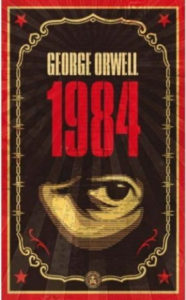
Copyright: Harvill Secker
Nineteen Eighty-Four, as the novel’s name is sometimes written, reveals a future dictatorship (from the time of writing) in which government control is pervasive over everyone. The novel anticipates the technical capacity to spy on everyone but is most innovative in imagining the language of this new world, Newspeak, a language designed to cover up truth. The protagonist, Winston Smith, becomes involved in a sexual relationship, which causes him to question propaganda for a while, though he is captured and re-educated and ends the story saying he loves “Big Brother,” the ubiquitous dictator of that part of the story world.
The setting of 1984 has clear parallels with Huxley’s Brave New World written seventeen years beforehand and was also inspired by Soviet communism, so this story is less original than most others on this list–3. Orwell’s story has rarely been exactly imitated, but the basic dystopian framework he laid out has influenced numerous other stories, including Gattaca. But that influence didn’t come from 1984 alone–4 points. As far as sales are concerned, Orwell’s novel has always sold well and continues to sell well, though not in the same category as One Piece–4 points. In terms of influence on public discourse, it’s difficult to imagine a story doing more to make the public generally leery of propaganda and government control, it’s main concerns–5 points. Total: 16 points.
Negatives: as far as lack of references to God are concerned, a dystopian hellhole of a story setting is a perfect time to refrain from mention of God if you ask me. Though it’s interesting that sex is what caused Winston to question the party. Because the party suppresses all forms of joy, including sex apart from reproduction. So in effect following a natural human impulse, one the Bible would classify as sinful outside of a marriage, is portrayed in a positive light, as helping Winston. Which I wouldn’t agree with.
Note there’s a joy and freedom in contact with God, as well as sexual joy, one more to what I would think the point is–that is, the government can control my body, but they can’t control my mind. Though in fact, 1984 declares a totalitarian dictatorship can control your mind…
2. The Matrix
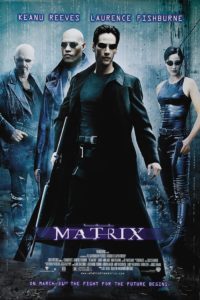
Image copyright: Warner Brothers
1999’s The Matrix perhaps could be accused of being less original than I’m going to give it credit for. Cyperpunk had been done before The Matrix, starting with William Gibson’s Neuromancer (ironically perhaps, published in 1984). Gritty dystopian had been before, such as in 1984. But The Matrix uniquely combined the gritty post-apocalyptic world of the film’s Zion with the slick dystopia of The Matrix itself. Even folding in a superhero story. Each one had been done, but not all in one package. Also the movie contains numerous themes that relate to religion and an examination of the nature of reality–for example, in some ways Neo is like a Christ figure, though in other ways not.
Overall, I rate this film 4 for originality. Its focus on martial arts and slick dystopian feel I would say influenced plenty of other movies, 4. The sales of The Matrix were very good, but leveled off somewhat as the series continued, 4. And while not everyone talks about The Matrix in a philosophical way, ideas like taking the red pill instead of the blue pill have entered common talk. The movie also gets people thinking about the issue if what we see and sense really is a reliable indicator of what the real universe is like. A very important topic when talking about science and faith–4 points. 16 points total.
Downsides? A number of things. Sensuality (though not sex), profanity, violence, an implication at one point that Buddhists may be right in how they see the world as one that can be manipulated by meditation. Worse, later in the series it would be awfully easy for someone to compare The Architect (the master computer program enslaving humans) with God–a very negative view of God. Though Messianic ideas also attach to Neo, in some ways his entire world and the colony of Zion, while we can draw parallels with the Christian life, in reality form more of a substitute for God’s work in the world than an allegory for it.
1. Alice in Wonderland
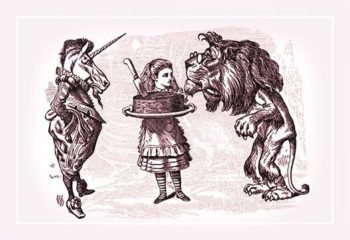
Painting by Sir John Tenniel
It’s hard to be more original than the 1865 novel that made travel to an entirely different world as simple as falling down a rabbit hole. The influence of Alice In Wonderland on portal fantasies has been tremendous. With all kinds of strange references that were meant to have a zany appeal to children, this story has also been hugely influential on children’s literature. Nearly all children’s literature. Lewis Carroll also embedded a number of mathematical puzzles in his tale and certain scenes that have an appeal to adults.
The most original concept of Carroll’s was simply passing down a rabbit hole to enter another world. But much of the setting was certainly original–I give this story 5 points. In terms of influence, as Josh Foreman pointed out on Facebook, even Oz and The Chronicles of Narnia owe the basic concept of a portal to a fantasy world to Carroll. How could it be more influential?–5 points. Certainly Alice in Wonderland has been a success in sales and in many translations and newer versions of the original–5 points. Only in terms of influence on public discourse does this story lag behind, since few people I know discuss it regularly–2 points. 17 points total.
Downsides? I must confess not having read the original novel. I’ve only watched several film adaptations, which may not have been faithful to the original tale. What I saw was a secular as any other tale in the list here. Though the original may not have been, so I won’t comment further on that topic.
Conclusion
Based on the list I’ve compiled, the most original stories don’t necessarily have to be the ones that get people talking about important issues. But may of them do–and for many, the issues they bring up rather overtly at times make the story more interesting than it would otherwise be, not less.
But readers, what do you think of the list itself? Hate it? Agree / disagree with particular points? Have your own list you’d like to share? Please let me know your thoughts in the comments below!
(By the way, below is the link to my podcast talking about the same subject in different words:)
https://travissbigidea.podbean.com/e/top-ten-most-original-speculative-fiction-story-worlds-part-1/

































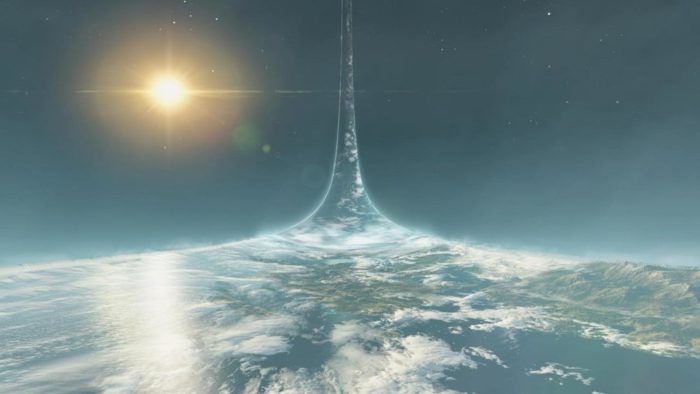




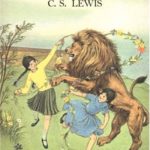


I missed the original, so my own fault for not getting in on that. But for what it’s worth, some I’d include in a list I’d make…
Discworld: I’ve usually enjoyed Pratchett’s stories, and his slightly satirical take on things.
Warhammer 40K: The scale of what this story-verse has become is close to overwhelming, which could be a minus when trying to tell a newbie where to begin, but still very impressive.
Star Wars: Use to devour the books several years ago.
D&D: Also went through a phase where I enjoyed Forgotten Realms and Eberron. Didn’t get as much into Ravensloft, though there was some interest.
Warhammer and D&D are immersive, but they deliberately borrow from many sources. So not so original.
Discworld was in some ways very original. But a lot of things, including the disc of the world itself, were based on mythology.
Star Wars. Immersive and detailed but not all that original in many aspects. Flash Gordon and certain other stories influenced it.
Anyway, that’s why I didn’t include those…
The Miller Brothers who made Myst are devout Christians who wanted to make a game that wasn’t all about shooting things. They continued to live in their trailer homes while donating most of their profits to missionaries. What they did inspired my son to think about building his own media empire with his brother. Well, brother got too sick to program any more but Josh still continues building the foundation of his media empire.
Thanks for sharing that! (When I looked up info on the game, that didn’t come up.)
This is true. I lived in the same city as them (Spokane Wa) and worked with their daughter, so I knew them somewhat well and their daughter very well.
The main thing that stood out to be about this list is how you commented about how most of them exclude God, and honestly I think that’s an irrelevant comment. You can’t hold secular stories to Christian standards. If it’s written by someone who isn’t a Christian, obviously it’s not going to talk about God in positive ways. That doesn’t take away from it being an original and groundbreaking good story.
That said, I haven’t read (or watched/played) most of these. I recently started reading Ringworld and just misplaced the book, so I have to find it in order to finish it. oops.
I’ve read Alice in Wonderland and seen the first two Matrix movies (the first was amazing, the second was mostly terrible and made me lose interest in the series). I tried played Myst once, but I was pretty young and never got past the first scene.
David, I’m fine with you disagreeing with what I think is pertinent.
However, I do have a purpose in pointing out the obvious. That purpose relates to the fact many posts by fans of speculative fiction celebrate pretty much all speculative fiction, as long as it’s entertaining and not too drenched in sin.
I have been an advocate of the idea that speculative fiction has been a tool of Satan in some ways. Not in the fuddy-duddy fundamentalist notion that if a story mentions magic or aliens it will cause a reader to be demon-possessed or something. But spec fiction has overall advanced a number of agendas, which has included treating faith as abberant or odd or not worth mentioning. Even though a brief look at history will reveal humans are in general quite religious.
Even at times when people are most likely to think about God, such as when facing tragedy or pondering the nature of what it means to be human, much of speculative fiction leaves God out. Of course, other genres do this, too. But speculative fiction has a unique ability to capture imagination and set expectations for the future that other genres don’t match.
My thought is Christians can enjoy stories with embedded anti-God messages but we should be aware of such messages and openly point them out. As we in the meantime seek to use these genres to embed our own counter-messages. But first, we need to become more original and bolder in making story worlds. In my opinion.
I have felt many works by Christian authors are insufficiently bold or original in creating story worlds. I hope these two posts will inspire someone to see stories differently–to think first about their story worlds, as opposed to thinking first about characters. Because story worlds done right really can influence the way people think about reality.
Not mentioning God in the story is not an anti-God message.
No. But if the story does, by design and intention, oppose even basic Judeo-Christian conceptions of reality (including but not limited to the fact that human marriage/family are societal goods), then this is indeed an anti-God message.
Anime is probably one of the best places to find originality. That said, in some ways it might be harder for us to know what’s original and what isn’t. The average American isn’t super in tune with all the tropes in Japanese media, so some anime might seem super original when it isn’t. Spirited Away is a great example. It’s a great movie, well beloved all over the world by people of all ages. It might feel original to us, but over in Japan such yokai stories are fairly numerous, it’s just that Spirited Away happens to be one of the popular ones. Still, it’s been very influential. Recently I listened to a review of it, and the reviewer said that based on his research, Spirited Away inspired the spirit city in Coco, for example.
Naruto feels fairly original, but is based partly in Japanese mythology and partly in older ninja anime. Though there probably is a lot of originality to it, considering the author made an entire system for how ninja society worked and combined it into its own world.
Bleach is also kinda original, at least to us. A boy gets thrown into the world of shinigami after encountering a shinigami named Rukia. They fight creatures called Hollows, and there’s lots of interesting elements to shinigami society in this tale. One interesting thing is their swords, which they usually have to develop a bond with, and the swords have a humanoid form.
The reason I mention Naruto and Bleach is because they are about as popular as One Piece, have a lot of original aspects, and had a pretty big influence on culture. From what I understand, Dragonball Z is kind of in the same boat and even inspired the author of Naruto and a lot of other manga artists.
Anime is willing to play with tons of new ideas, though, even if there’s a lot of common tropes and times when these shows will influence each other.
Death Note is about a boy that finds a Death Note dropped by a shinigami named Ryuk. If someone imagines a person’s face and writes that person’s name in the Death note, that person will die. When Light finds the note, he tests it out, then decides to kill off all the bad people so that only good people are left. He decides to become the ‘god’ of this ‘new world’ so that he can ensure his goal, but he is countered by L, the world’s greatest detective. It’s sort of a ‘classic’ anime, one that gets recommended to a lot of anime newcomers, and gets pretty memorable in terms of jokes and memes, and a few movies have been made(they aren’t very good, though. Anime or manga is the way to go with this story)
Wolf’s Rain is sort of in the same boat, and its premise is that, in the last days, Paradise will appear on the earth, but only wolves will be able to find it. Wolves are supposedly extinct in this sorta post apocalyptic world, but they do still exist. They hide by casting an illusion on themselves that makes them look like humans. One wolf, Kiba, smells the scent of lunar flowers, which he instinctively knows will lead him to paradise and feels the urge to follow it. He is eventually joined by other wolves on his journey and all its hardships. The story world is sort of odd, but very interesting, beyond what I described. It’s another ‘classic’ in some circles, especially among nature lovers. The authors of one awesome indie comic (Off White) even listed Wolf’s Rain as one of their inspirations.
Attack On Titan is a lot newer, and I’ve only seen a lot of the first season. But its world building is very good. It’s premise is that the last of humanity lives inside a walled city(there’s three walls, actually. The innermost wall is the highest) Giant humanoid beings called Titans occasionally attack the city, and humanity can barely counter them. It’s a dark story, but very good. The Titan hunters use very interesting equipment and methods to fight. Certain tropes are upended, like the way the average shounen protagonist tends to be. The Titans themselves are more and more fascinating and unique as the audience learns more about them. As time goes on, there’s many aspects of this story world and it’s history that are unique and unexpected.
Attack On Titan’s a lot newer, but it’s very popular and from what I understand has even been added to some theme parks as well. It’ll probably become an anime ‘classic’.
I was wondering if One Piece was all that original even for anime. Worldbuilding, yes, but it’s a shounen and I think the shounen formula was more or less assembled by Astro Boy or Speed Racer in the ’60s.
I know a lot less about anime than you do but I was struck by the versions of Gundam I’ve seen that it wasn’t all just silly slapstick stuff–which is how anime in general strikes me.
Anime is willing to be silly, at least at times–that I’m sure of. In a way, that’s charming–Japanese storytellers don’t seem to be wrapped up in pride about themselves.
The willingness to do anything is part of what makes anime so often original. But I honestly prefer stories that seem more plausible. Though I know anime goes to plausible-land, too. I’ve seen it. In some of the versions of Gundam (which included some very sober commentary on the nature of war).
As far as including One Piece is concerned and not other anime in my list, several people I respect advocated specifically for One Piece on Facebook. And when I looked up information on it, I saw it has been a huge commercial success. Like, more than Gundam probably, and Gundam is huge. So based on that as well as the assurances from other people that One Piece is detailed and original, I included it on this list.
Like a lot of things, it depends on the intended audience. In fact, most of the jargon Autumn and I throw at each other refers to the age of the intended audience. Shounen is pretty analogous to YA fic.
Well, I’m pretty serious and tend to dislike silly slapstick stuff too, so I definitely don’t blame you for wanting to avoid that. If anything, too much silliness is why I haven’t really given One Piece a chance beyond the few episodes I’ve seen. Either way, I wasn’t criticizing One Piece’s place on your list(hard to do that when I haven’t seen it). But in the request for commentary at the end of your article, you asked if we had our own list of stories with original worldbuilding, which, for me, would include many anime. So I described several for people that might either like to watch them, or who DON’T want to watch them but might be interested in or inspired by the variety of stories out there.
I guess to understand the hype surrounding anime, one has to really consider that the usual definition is ‘Japanese animation’, or more recently, ‘Asian animation’. In that sense, it truly should be interpreted more as an art medium than an actual genre. It can be anything and often is. In many ways, an equivalent is ‘Western film’. Someone in Asia could see things like The Bachelor and The Bachelorette and feel like most Western film is like that, even if they may have seen Breaking Bad and know that there’s at least one or two Western films that are actually good. And assigning the connotations of The Bachelor to Western film would mean they would miss out on several of the treasures you listed in your article. But of course Western film is so much more broad than The Bachelor. Just like anime, film can literally be anything and there’s something for everyone.
Most of my favorite anime are way more on the serious side with very little, if any, slapstick. Fate Zero and Attack On Titan, for example, do a lot of work to make things internally consistent with their story world so that it feels real and immersive. And those shows definitely have lots of sober commentary on the nature of life and war. Wolf’s Rain feels mostly real within its story world as well, but it has a different feel. It doesn’t have much humor in it(Fate Zero and Attack On Titan don’t have much either, though what they do have is more character and situation driven than slapstick). And Wolf’s Rain has a somewhat odd but beautiful and sad feel to it. I mean, I’m not trying to force you to like anime or watch these shows, but in terms of understanding why so many people love anime, let’s just say that the Gundam like shows are way more common than you’d think.
To clarify something notleia said, about shonen being like YA…YA and shonen are alike in the sense that they are targeted toward teens, but there’s really a lot of differences. Even though people of all genders and age groups enjoy YA and shonen, shonen was mainly intended for teen boys, while shojo is mainly intended for teen girls. Shonen tends more toward action and adventure, while shojo contains more romance. YA is more general, though of course now days there’s certain things in it that are super popular, like dystopian societies. But the tropes currently popular in YA are different than the popular tropes of shonen and shojo.
Ok. Thank you for those clarifications and explanations.
Hm…I don’t know if I’d say that Jurassic Park has an original story world, only a unique premise, though you kind of mention that.
I went through a Jurassic Park phase in my early teens, so that’s one of the things on the list where I actually saw/read both the books and the show. If I recall correctly, one char(in the books) kinda scoffed at creationism, so God and religion were mentioned a little, just not necessarily in a positive way.
I loved Arrival, though I haven’t read the short story, so I may be interpreting the show wrong. But I felt the movie was reasonably friendly toward free will. It looked like the main char became fully aware of what would happen and had ways to prevent certain things (such as her future divorce) but chose not to. It was like she looked at her life and decided that certain things, like her daughter, were worth choosing even if they came with the agony of loss. I don’t think the movie implied or said that her fate was inevitable, exactly, and maybe even posed the question of whether one would make the same choices after knowing the results. So I guess I took it as saying people have free will, but don’t always see hardship as something to avoid. Something else that seemed really fascinating was why the aliens said they were there, though. The fact that they knew, some day, they would need humanity’s help, which is a different take than I normally see, though I probably haven’t read enough classic scifi to know if that’s unusual.
Alice In Wonderland and its sequel are pretty good, and short, from what I recall. Quite a bit different than the Disney movie in many respects, and probably worth a quick read. One great thing about that story is that it’s pretty much achieved fairy tale status by now, so so many people use it for story fuel like they would Little Red Riding Hood and Cinderella. There’s been quite a few songs that use Alice In Wonderland elements, and it’s so fun to see stories even just using Wonderland themed aesthetics.
Now that I think about it, maybe Godzilla would be a good spec fic story to mention for a list like this. It’s had so much popularity and many remakes, some of which have thought provoking elements, like that anime movie series on Netflix I mentioned before. Well, I haven’t really payed much attention to Godzilla over the years, but that anime series was good (or at least the first two part of it were) and thinking about it makes me realize Godzilla’s overall influence on pop culture.
There’s quite a few other anime that have an interesting premise or worldbuilding, and even explore some spiritual matters within the story. Not from a Christian standpoint, but they can still get people thinking about spirituality or even help them understand some Christian concepts better. I’ll save that discussion for a bit, though, just in case you end up posting an article/list that discusses non Christian shows that have elements of spirituality that Christians might find inspiring 😛
Jurassic Park though featured Michael Chrichton inventing the idea of bringing back lost species through genetic engineering. As far as I know, he was the first person to propose that. Rather like how the communications sattelite was first proposed by Arthur C. Clarke in a science fiction work, before any “serious” scientist ever mentioned it.
Also, pulling DNA from creatures trapped in amber was another wholly original Chrichton idea as far as I know, one that scientists have done after the fact, in a case of life imitating art.
Plus Crichton threw in Chaos Theory to explain why a Jurassic Park would not work.
So, yes, the world of Jurassic Park is like our world. But the specific story setting involved some very original thinking on Crichton’s part.
Godzilla original? I’m afraid it borrowed from many other monster tropes, dear Autumn. Even the size of the beast came from King Kong.
Well, I never payed much attention to Godzilla or King Kong, I just brought it up since I know it was at least one of the earlier influential kaiju stories. I wasn’t entirely sure that it was the first of it’s kind and of course didn’t know it came after King Kong, but thought it might be worth mentioning, even if only to point out the influence of those early kaiju stories in general.
I agree that Jurassic Park was fairly original in terms of premise, but your article was titled based on World Building, and what I was saying was that Jurassic Park’s world building isn’t unique, only its premise. That’s fine with me. I mean, I brought up Death Note and it’s pretty much in the same category of having a fairly unique premise without a ton of world building(though there certainly is some world building in Death Note, and its premise looks like it was thought through more intricately than Jurassic Park)
And I guess every story borrows from something, so I don’t know how much ‘borrowing’ disqualifies something from being original for the purposes of this article series. I mean, even though Crichton was pretty original with the premise of Jurassic Park, he definitely didn’t invent dinos, theme parks, corruption, scientific/technological advancements going awry, or the idea of rich people funding destructive things.
Yeah, it’s a fair criticism. My use of “world building” was elastic and I applied it in different ways without pointing it out. Myst got in because of extreme attention to many details (at its best version in Riven especially, from what I read) without a whole lot of overarching ideas (though there were some). Which is probably what most people mean by “worldbuilding.”
But other stories I counted as having great original worldbuilding just because they had a few very original ideas for their time that were wrapped into an otherwise ho-hum storyworld (Foundation, Jurassic Park).
A more accurate term for what I meant would have been “setting” rather than “story world.” Because I think it sounds more interesting to talk about worlds, I in effect treated “story world” as a synonym for “setting.”
Setting is actually a bigger category than story world. It includes the scenario that launches the story. Which would better describe a writer inventing story ideas that were so original that they inspired real science.
So yeah, it would have been more accurate to call this post, “Top Ten Most Original Speculative Fiction Settings.”
I think it’s a bit late to change the title now. Plus, I dislike the term “setting.” Makes me think of fancy dinners…(but I will mention in my next post that “setting” is a more accurate term).
@notleia: I tried a few episodes of One Piece and didn’t like it, even though the premise sounds interesting, so I don’t know exactly how it compares to other shounen in terms of tropes. But it doesn’t look like shounen is always THAT tied down to tropes. Like, Naruto seems to follow some tropes(main char that’s sorta loud and goofy, has a rival, etc) but that sort of seems to be a ‘type’ of shounen, the long, popular battle, quest, exploration, etc centric ones. But then I think that Death Note was technically a shounen but ended up being way different. You can say that L is Light’s rival, for example, but their whole dynamic is very different than what I’ve normally seen. Either way, Light doesn’t seem like the typical popular shounen protagonist.
Have you seen Noragami or Attack On Titan?
IIRC Death Note is a seinen rather than a shounen.
I’ve seen the first season of Noragami, and I remember the larger story beats but I have not felt an urge to rewatch it.
I watched like 2 episodes of AoT and then needed to binge like 8 episodes of moe trash to get the nihilistic taste out of my mouth. Maybe it’s just a sign of my getting Old, that I’d sooner watch cute, pointless moe than edgelord bait, even if AoT has a better plot. I’ll just read the wiki if I feel I need to.
Oddly enough, nihilistic stories repulse me, and despite the profound darkness in “Attack on Titan,” I wasn’t catching a nihilistic vibe. I suppose that would depend on how the series ends. It’s been riding the line directly between nobledark and grimdark, and yet the promise of real answers for the dark mysteries always remained—and now is underway. That keeps me going. “This world is cruel. But it’s also very beautiful.” So did that quote from Mikasa.
Autumn, do cringe through a few more dozen (yes) episodes of “One Piece” before you give it up. What with the old animation, “isn’t this dog CUUUUTTTE” moments, and then endless repetitions of pirates floating in water, and then more “isn’t it CUUUTTE” Usopp-telling-stories flashbacks, I almost gave up too. But then for the “Arlong Park” arc the storytelling jumps in maturity and genuine pathos, even while preserving the story-world’s wackiness and exaggerations. Then at about the moment Usopp gets his first boss-fight victory, and then repeatedly USOPP-HAMMERS the foe, I became a true fan. Also that moment with Luffy, Nami, and that straw hat …
By now the producers have actually gone back to the older arcs and condensed/re-animated those into feature-film formats. Those might also help.
I don’t mind a bit of nihilism in my stories, though I don’t like nearly every story to be nihilistic. The words you quoted from Mikasa are actually something I identify with, though. Well, by your definition I guess Fate Zero would be noble dark, too.
Of course, from a philosophical standpoint, there is something called hopeful nihilism, so Attack On Titan could subscribe to that.
Maybe I’ll give One Piece another shot some day…and even skip right to the arc you’re talking about. I’m not above that :p And I know that even with series like Naruto, it didn’t start off amazing either, though even with some of the cringiness, Naruto still managed to click with me. Though I did see a few episodes of the Shippuden series before watching the original Naruto series(that’s how I found it and got into anime in the first place) So I did know that getting through the first few cringy episodes of Naruto would be worthwhile.
Welp, not just the nihilism of AoT. It was also the gore and not being engaged by any of the characters and the complete lack of fun besides maybe Potato Girl.
Travis, thanks for this article. Thoroughly enjoyed reading it, and I’m enjoying all the comments. I’ve read and/or seen all but Myst and One Piece. Growing up in the 1960s read everything Asimov wrote. He influences my writing today, even though my genre is supernatural thrillers and not sci fi. Have to say, if I was forced to pick a favorite (hard to do!) it would be Jurassic Park. Love everything Crichton. Not certain if you would consider Phillip K. Dick’s work, “Do Androids Dream of Electric Sheep” (Blade Runner), world building, but that short story and most of Dick’s “ahead of his time” writing had tremendous influence on the genre and numerous authors. I’m a bit surprised you left out Dune by Frank Herbert. Powerful world building, multiple movies and spinoffs. Know you had to pare down to top 10. I suppose we could keep adding. What about expanding to a top 25? LOL. So many really good novels that both entertain and get our “little gray cells working” as Hercule Poirot is fond of saying. So little time . . . Ahhhh. Thanks again for sharing. 🙂
Thanks for your comment!
Dune certainly has a lot of original elements…but also borrows heavily from history for a lot of things. In fact, the echoes with history are part of what makes Dune intriguing…however, it does strike me as rehashing a lot of actual, real-world conflict. It’s a judgment call and I judged Dune too derivative. (Sorry!)
Though Dune is nowhere near as blatantly derivative of history as Game of Thrones. 🙂
Your choices seem good to me. Strong nostalgia rushes for Ringworld and Foundation. They both were major books for me as I got out of high school and discovered that the reality taught me in high school in the 50s was truly a fantasy construct. It’s why I’ve always said, “The fifties caused the sixties.”
Thank you!
Yeah I agree in many ways the 50s led to the 60s. Often people set up a sharp contrast between the two, but in reality the one stemmed from the other.
And the 60s started changes that have shown themselves to be permanent in society…
Note I had someone ask me on Facebook to list the stories I considered for this list that didn’t make the top ten cut for me. I’m adding those names to this comment. In order of top to bottom of the back of the envelope I wrote them on (not kidding about that 🙂 ) :
Heavy Planet by Hal Clement; Bniti by Nnedi Okorafor; Logan’s Run; Planet of the Apes; author Frederick Pohl; Farenheit 451 by Ray Bradbury; Quintessence by David Walton; Quarz by Rabia Gale; Lud-in-the-Mist by Hope Mirrlees; Dune by Frank Hebert; Starship Troopers by Robert A. Heinlein; Neverwhere by Neil Gaiman; Bloom by Will McCarthy; Dark Souls video game; Southern Reach Trilogy by Jeff VanderMeer; Mistborn series by Brandon Sanderson; The Way of Kings by Sanderson; Ayphae by Ian Vroon; The 4400 by Neal Shusterman; UnWind series by Shusterman; Barsoom series by Edgar Rice Burroughs; A Martian Odyssey by Stanley Weinbaum.
This list of stories I considered primarily comes from people who made suggestions on Facebook. However, some on this list popped into my mind as I wrote down the suggestions of others.
The main reason why most these stories did not get included in my top ten is because I was insufficiently familiar with them and when friends lobbied for these tales, they gave explanations for what made the stories original that didn’t capture my interest (e.g. I was told the Mistborn series has “unique magic” but that was all).
Or, in some cases I knew the stories quite well but judged them to be too derivative of other stories or real history (e.g. Dune) or insufficiently influential/relatively obscure (e.g. A Martian Odyssey).
In the end, the decisions I made were my own…